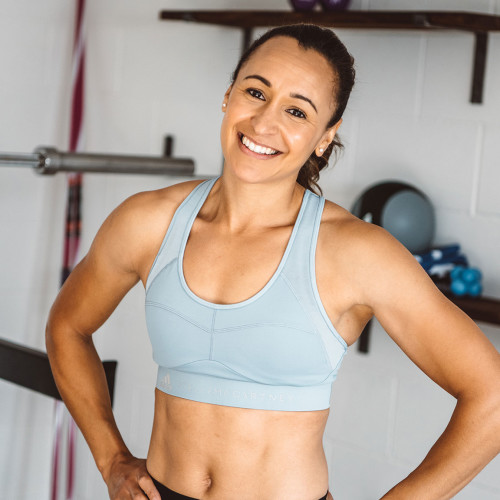How to eat smart during perimenopause
5 months ago
Perimenopause5 months ago
Perimenopause
Worried about perimenopausal weight gain? Feeling overwhelmed by conflicting perimenopause nutrition information on social media? Dietitian Laura Clark explains how to make the best choices for our bodies and minds during this stage of life…
Without the right nutrition advice, we can easily feel the pressure to restrict calories, avoid breakfast and say no to the foods we enjoy and love… because it’s what we’ve always been taught.
However, because perimenopause is a very different hormonal phase of our lives, it requires a very different approach to eating in order to support what’s happening.
Here, we speak to Laura Clark RD ( @menopause.dietitian ), a Registered Dietitian specialising in perimenopause, about how to eat differently, what supplements can support our health and what to avoid.
Dubious nutrition-based Instagram posts would have us believe that there are specific superfoods that can ‘cure’ our perimenopausal symptoms. Unfortunately, it’s not quite that simple and there's no set perimenopause diet, says Laura : “Instead of pinpointing particular foods as ‘bad’ or ‘good’, we need to pull back and look at our diet as a whole.”
Rather than eliminating foods or drastically cutting calories, a good first step is to make sure that you’re eating a good balance of the five main food groups:
Fruits and vegetables
Starchy carbohydrates
Dairy and alternatives
Protein
Foods high in fat and sugar
As we age, we lose lean muscle mass, so it’s really important to eat enough protein to limit this loss
To eat a balanced diet, we should aim for at least five portions of fruit and vegetables, base our meals on higher-fibre starchy foods, add in a source of dairy (or a vegan alternative), include healthy fats and aim for at least 45 grams of protein each day.
As we age, we lose lean muscle mass, so it’s really important to eat enough protein to limit this loss. Activity levels, body weight and the addition of strength training into your week will alter the amount you need, but a good rule of thumb is to aim for 1g of protein per kg of body weight.
Researchers have also looked specifically at whether a Mediterranean-style diet can help to manage menopausal symptoms. This specific diet is inspired by the eating habits of people who live near the sea in countries like Greece, France and Italy, and includes lots of healthy foods like wholegrains, fruits, vegetables, seafood, beans, and nuts.
There is some evidence to suggest that this style of diet can improve some short-term menopausal symptoms, such as hot flushes and night sweats, as well as protect against diseases such as diabetes and cardiovascular disease. On the Mediterranean diet, no food is banned, but you are encouraged to limit processed and sugary foods which can cause inflammation.
Once we’ve looked more holistically at our approach to food, Laura says we can start to think about helpful foodie tips…
Changes in your hormone levels during perimenopause can exacerbate fluctuations in your blood sugar levels, which can quickly leave you feeling drained and exhausted.
A simple dietary tweak? Switch out white varieties of bread, pasta and rice for wholegrain alternatives.
“Eating wholegrain carbohydrates helps to regulate your blood glucose and maintain your energy levels throughout the day,” says Laura. “Wholegrains are estimated to give you around 75% more fibre and 25% more protein too, so they’re a more nutritious option than white refined alternatives.”
Good sources include oatmeal, barley, brown rice, buckwheat, bulgur, millet and wholewheat bread, pasta and rice - “I’d aim for at least two portions per day,” she adds.
They're also a rich source of magnesium, which is a particularly big deal for perimenopause, as it supports good bone health, helping to guard against osteoporosis (which we’re at a higher risk of), while also helping to support good, restful sleep.
Calcium, iron and zinc are key players during the perimenopause. While calcium supports our bone health, iron helps to regulate our core body temperature when hot flushes strike. Zinc is also important for our health and energy in midlife, as it’s involved in regular hormone production.
“When it comes to these vitamins, dark leafy vegetables always come out on top,” says Laura. The colourful compound that gives green vegetables their visual appeal - chlorophyll - has potent health benefits too. It’s considered a powerful antioxidant that can prevent the damage caused by free radicals; unstable atoms that cause illness and ageing in the body.
To reap the body-boosting benefits, load up your fridge with deeply-coloured varieties of bok choy, spinach, kale and cabbage. Leafy greens can easily be chopped up and thrown into a quick midweek stir fry or washed and whizzed into a post-workout smoothie.
The humble nut packs a nutritious punch. As well as being a good source of protein, these mighty warriors contain B vitamins, vitamin E and minerals, including iron, potassium, selenium, magnesium, zinc and copper.
“After the menopause, our risk of cardiovascular disease increases and nuts give our bodies that cholesterol-lowering impact,” says Laura
“Using them as snacks or mixed into salads is a really good way of boosting our natural intake of various vitamins and minerals which we know support overall health - and they’re a good source of fibre too.”
Nuts can be expensive to eat day-in-day-out, so opt for cheaper varieties like peanuts if you’re on a tight budget. You can also get a nutty hit by slathering peanut or almond butter on your toast in the mornings.
“As oestrogen levels fluctuate during the perimenopause, we’re more likely to be in a pro-inflammatory state. Omega-3 fatty acids foster an anti-inflammatory environment in the body,” says Laura.
Opt for sustainable sources of oily fish, such as salmon, mackerel, anchovies and sardines, as these are rich in EPA and DHA – which are long-chain, Omega-3 fatty acids.
Our bodies convert the marine fatty acid from these varieties of fish into compounds called resolvins and protectins. These vital compounds can reduce chronic inflammation in the body, which is the kick-off point for many diseases and health conditions.
“We don't convert short-chain fatty acids found in plant foods very efficiently, so if you’re vegan, I recommend that you take an algae-based supplement,” says Laura.
Step into any health food shop and you’ll notice there’s a whole raft of perimenopause supplements that promise to banish symptoms and boost health. So, do you actually need them and are they worth your money?
“I think it's really key that we take a ‘food first’ approach,” says Laura. “As humans, we're built to digest wholefoods and extract the nutrition from them. Taking vitamins in supplement form is always going to be slightly different and you can't supplement your way out of a bad diet.”
“That said, taking a vitamin D supplement, particularly in the dark winter months (September to April) is a must,” says Laura.
Instead of thinking about how we can eat to be slim, it can be helpful to ask how we can eat to support and nourish our perimenopausal bodies
The NHS advises that everyone should take a 10 mcg supplement of vitamin D a day, particularly when the sun rays aren’t on our side. As well as maintaining energy levels, vitamin D is an important mineral for the protection of bone composition and the uptake of calcium into the bone.
“When it comes to herbal supplements, there are various supplements that have mild oestrogenic effects, which may or may not provide some relief to menopausal symptoms,” says Laura. “Black cohosh, sage, evening primrose and St John’s wort are all popular options, but the data is quite limited and contradictory.
“Under the advice of a GP, you can always trial a supplement and check in after three months to see if you’ve noticed a difference. If not, then perhaps reconsider.”
“Some studies have found that the isoflavones in soy products can reduce hot flushes. The effectiveness of soy, however, seems to depend on the diversity of the gut microbiome and whether we possess certain bacteria that can break isoflavones down,” says Laura.
During this breakdown process, our body produces a compound called equol, which Laura says is the ‘magic’ compound that ‘seems to do the trick’ in terms of the reduction of hot flushes.
“As with all supplements, there can be individual variation - it's not a one-size-fits-all approach,” warns Laura. “Two of the supplements that can be particularly beneficial are magnesium, which can help with sleep, muscle relaxation and cognitive function, and Omega-3 which also helps with cognition and inflammation.
Reducing caffeine, alcohol and spicy food in your diet may help hot flushes, but there is considerable variation person-to-person, says Laura.
“Plus, I’m also not sure that simply banning coffee and alcohol is helpful messaging, as these may be a coping strategy for something else that’s going on, such as poor sleep or stress, that needs investigation," says Laura.
The same goes with treat foods. “Research tells us that it's the core of your diet that makes the difference and, all of the stuff that you eat around the periphery - such as crisps and doughnuts - doesn't matter if you have a solid base,” says Laura. “I don’t think we should be banning ourselves from eating the foods we enjoy, but rather eating them in a mindful way.”
That said, reducing alcohol has other health benefits, such as a lower risk of liver and heart disease, as well as certain types of cancer.
At this stage of life, Laura believes that taking weight off the table can be really empowering. “Instead of thinking about how we can eat to be slim, it can be helpful to ask how we can eat to support and nourish our perimenopausal bodies.
“And, rather than thinking about what we can deplete or take away from our plates, let’s think about all the nutritious foods that we can add in as part of our perimenopause diet.”
Find out more about Laura Clark, here
 Cycle syncing
Cycle syncing Perimenopause
Perimenopause Perimenopause
Perimenopause Perimenopause
PerimenopauseSign up to learn everything you need to know about CycleMapping, plus how you can live better and feel better through optimising your fitness to you.
This website uses cookies to ensure you get the best experience on our website. Learn more

Sign up for the very latest news on women's fitness, health and hormones, plus be the first to receive exclusive offers and extras